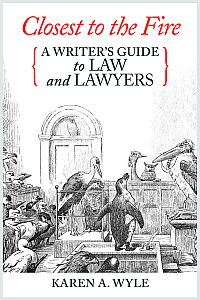One of the coolest aspects of being a reader (if you ask me) is the chance to live so many lives. As readers, we get to experience all types of characters, backgrounds, jobs, settings, etc. We’re not stuck with just one life.
A similar benefit applies to writers. As writers, we get to research and learn about anything we want. Depending on our genre, we might learn about rocket propulsion, the Australian outback, or modern blacksmiths.
Some writers might feel intimidated or frustrated by research, but I love it. If I’m not learning something new every day, I feel like I haven’t lived.
For me, the research necessary for a book is a great excuse to keep learning. Sometimes, I’ve even thought about what I wanted to learn about and decided on a book’s setting or a character’s situation based on what I feel like researching. *grin*
The problem comes when we think we know something, so we make assumptions without doing the research. One area many of us assume we know is the justice system.
Here in the U.S., there’s been no end to the TV shows and movies depicting lawyers and the legal system. So it’s easy to think that we “know stuff.”
In reality though, those sources don’t always get it right, and many times the legal system can touch our stories without entering a courtroom. So we might need to know more about the law than we think. As a bonus, if we expand our knowledge, we might also expand our story ideas in ways that get away from the clichés.
Today, Karen A. Wyle is here to share insights—and story ideas!—about the law, lawyers, and the justice system to help our writing. Please welcome Karen A. Wyle! *smile*
*****
4 Legal Areas of Interest to Authors
and Story Ideas to Exploit Them
When books and movies feature lawyers and legal goings-on, the lawyers in the audience are likely to end up cringing. Divorces tried before a jury? Almost nowhere!
Defense lawyers agonizing over the possibility that the client is guilty? Not unless they’re fresh out of law school and/or entirely unfamiliar with criminal defense work.
The doctrine of double jeopardy allowing a convicted murderer to track down and kill the not-actually-dead victim? Uh-uh.
Thundering cross-examinations leading to shouted or blubbered confessions? Almost no judge would allow such treatment of a witness.
And speaking of murders and cross-examinations, they make up a pretty high percentage of legal drama, don’t they? But there’s so much more story potential to be found in the law. Here are a few scenarios you could explore without repeating either familiar plots or familiar errors.
Scenario #1: Divorce—When It Happens Makes A Big Difference
Hostility, heartbreak, struggles over property both valuable or symbolic, miscommunications: these are all likely elements in tales of a marriage falling apart. But the mechanics have changed a great deal with time, and those differences could have a big impact on your story.
Before things started changing in 1970, married couples in the U.S. could only obtain a divorce based on “fault,” usually meaning misconduct of one—and only one—of the spouses.
The “fault” could be adultery, or abandonment for some specified period of time, or deliberate infliction of physical or emotional pain (often called “cruelty”), or commission of a felony that landed a spouse in prison. Sometimes, the hardly intentional or culpable ground of “impotence” or other inability to have sexual intercourse also sufficed.
Defenses to an action for divorce included the “them too” defense, known as “recrimination.” Success with this defense resulted in a Pyrrhic victory: the mutually misbehaving couple remained married.
Story Ideas for Divorce: Faking a Fault
What if both spouses wanted out of the marriage, but neither or both had committed adultery or any of the rest? It was actually common for the spouses and their attorneys to put on a fictional performance in court, most often with the wife testifying that the husband had been physically abusive or unfaithful.
Sometimes, the couple would arrange for the wife to come home and find the husband with a supposed lover hired for the occasion, but the wife’s testimony would still contain some falsehoods as to the context of this “discovery.”
If the court decided to notice the staged nature of the event, it would find “collusion” and deny the divorce. The couple might then bite the proverbial bullet and arrange for one of them actually to commit an action that would justify the divorce.
You could take the struggle to get a divorce in as serious or farcical direction as you please. Your couple could be sophisticated types, ready to shed the marriage and move on, cheerfully contriving more and more extreme scenarios.
Or a couple who loathe the sight of each other could encounter a judge who refuses to bend the rules, and one spouse’s growing frustration could erupt in the physical violence that would at last provide adequate grounds for the divorce.
Scenario #2: Trusting Eyewitnesses Too Much
For some undoubtedly interesting reasons based in evolutionary psychology and sociology, we tend to believe people who tell us what they’ve seen and heard. If they declare it under oath, we believe it even more.
The trouble is that eyewitness testimony is far less reliable than we’re apparently programmed to assume. There’s been extensive research over the last several decades suggesting that countless people have been convicted based on the sincere but erroneous testimony of eyewitnesses.
We tend to picture our memories as a sort of recording that’s made and then remains unchanged (except for some fading). That isn’t how it actually works. We construct our memories, filling in many blanks with anything from our imaginations to unrelated details.
For example, I might see Joe Blow on the elevator, then leave the building and see a street robbery. I didn’t get a great view of the robber, but I confuse and combine the two memories, so that I remember seeing Joe Blow commit the robbery.
Over time, we also reconstruct our memories; and we believe our reconstructions at least as much as we believe the initial construct. Questioning can also plant false memories.
In one experiment, test subjects who had visited Disneyland as children were shown what looked like advertisements featuring Bugs Bunny at Disneyland. Then they were asked if on those childhood visits, they had shaken hands with an employee dressed as Bugs Bunny. Quite a few of them remembered that experience—even though Bugs Bunny isn’t a Disney character and wouldn’t (absent some unlikely practical joke) be at Disneyland at all.
Story Ideas for Eyewitnesses: False Memories
Memory distortion due to questioning is even more likely in children than in adults. These days, with allegations of sexual abuse becoming common in contested custody proceedings, it’s all too likely that either parental or official questioning may be shaping children’s memories in ways that undermine or destroy their relationship with a parent. You could tell such a story from that parent’s or a child’s point of view.
Or you could try the POV of a witness who finds it impossible to believe that their memory has been contaminated; or of a victim who testified against the person they thought had attacked them, only to come to the horrified realization years later that their memories were tainted and unreliable.
Scenario #3: When the Innocent Plead Guilty
Most cases, civil and criminal, never actually go to trial. Criminal cases are usually settled by “plea bargains.”
In a plea bargain, a prosecutor offers to let the defendant plead guilty to a lesser charge than the one the defendant initially facing, or to one of several charges, and/or to receive a lighter sentence than the defendant could get if convicted of the charged crime.
This is possible because prosecutors get to decide whether to press a particular charge. The defendant may have a lawyer present, even if they can’t afford one and the county has to pay the bill; but in that case, the lawyer will be a terribly overworked public defender who couldn’t possibly manage unless almost all their clients plead guilty.
Story Ideas for Plea Bargains: Innocent but “Guilty”
Obviously ripe for dramatic treatment: the dilemma of a falsely accused prisoner who for whatever combination of reasons (e.g., poor or no legal representation, or highly misleading circumstantial evidence) feels compelled to plead guilty and agree to years of imprisonment.
You could also focus on a judge who has some reason to doubt the guilt of a defendant who’s just “copped a plea.”
Two variants on plea bargains are “no contest” or “nolo contendere” pleas, where the defendant is essentially telling the State, “Maybe I didn’t do it, but punish me anyway,” and “Alford pleas,” where the defendant still doesn’t admit guilt, but does admit that the State has enough evidence to get a conviction.
Some states won’t accept one or the other or both of these pleas in cases involving sexual misconduct, but in those that do, a convicted defendant could find himself in a serious quandary. Sentences for sexual crimes may include, as a condition of probation or parole, an order that the defendant complete a counseling program.
Such programs typically require those attending to admit guilt. Otherwise, they’re “resisting” therapy, and could be kicked out of the counseling program. That in turn could be treated as a probation or parole violation, which could send the defiant defendant to prison.
You could vary the idea I mentioned above, with your innocent defendant succumbing to the pressure to accept a no contest or Alford plea because at least it didn’t mean admitting guilt and then being sent to one of these counseling programs.
Scenario #4: Murder Without Killing
If a defendant is something of a bad guy, and really unlucky—what in Yiddish we’d call a schlemiel—they can be guilty of murder without killing anybody.
That’s right: if somebody dies as a result of something the defendant or a partner of crime does while committing a felony, the defendant may have committed “felony murder.” And the penalty for felony murder can be just like the penalty for any other kind.
Story Ideas for Felony Murder: An Unlucky Chain of Events
States differ as to what sorts of felonies can lead to a felony murder charge if someone dies, but violent felonies are most likely to qualify. A few states include a wider range of felonies: there have been felony murder convictions upheld for helping a minor obtain alcohol or assisting in illegal drug possession.
The death doesn’t necessarily have to result directly from any act of the defendant. For example, in some states, if a police officer fires at the fleeing culprits and the bullet hits an innocent bystander or one of the defendant’s accomplices, that still counts.
The idea is that the defendant set off the chain of events that led to the shooting and the resulting death.
Traditionally, felony murder could carry the death penalty if the felony fell (so to speak) within certain categories, typically arson, rape, or robbery. However, since 1982, a felony murder conviction can’t lead to a death sentence for a defendant who participated in the felony with no intent to kill. Choose your chronology based on how dire the danger you want your defendant to face.
If you want to tell a story about someone who gets in way, way over their head, felony murder lets you do it.
Want More Ideas?
There are a great many more areas of the law, both criminal and civil, substantive and procedural, that could provide the basis for compelling fiction. Let me tantalize you with a few:
- Entrapment: Where the police work really hard to get someone to commit a crime, and then nab the reluctant criminal.
- Prison Experiences: Being pregnant in prison.
- Jury Behavior: How juries can (a) misunderstand the law they’re supposed to be applying, or (b) understand it, disapprove of it, and get away with ignoring it.
- Sentencing Quandries: “Indeterminate sentencing,” where someone could go to prison without knowing whether they’ll be out in time for their daughter’s first day of school, or still rotting there on her wedding day.
If you want more background on the ideas I’ve explained, or on those I’ve just mentioned, or on all the ones I haven’t even hinted at, you can find it in my new reference work, Closest to the Fire: A Writer’s Guide to Law and Lawyers. Happy writing!
*****
 Karen A. Wyle is an appellate attorney with more than thirty years’ experience. A cum laude graduate of Harvard Law School, she worked for law firms and the California Court of Appeal before establishing her solo practice in Bloomington, Indiana. Wyle has filed amicus briefs in the U.S. Supreme Court and seven state supreme courts.
Karen A. Wyle is an appellate attorney with more than thirty years’ experience. A cum laude graduate of Harvard Law School, she worked for law firms and the California Court of Appeal before establishing her solo practice in Bloomington, Indiana. Wyle has filed amicus briefs in the U.S. Supreme Court and seven state supreme courts.
She has also written and published five novels. One-quarter of her novel Division is set a near-future courtroom. Find Karen at her website, Facebook, or Twitter.
*****
 About Closest to the Fire: A Writer’s Guide to Law and Lawyers:
About Closest to the Fire: A Writer’s Guide to Law and Lawyers:
Write about the law—and get it right!
The world of law and lawyers, with its suspense, its moral quandaries, and its ripped-from-the-headlines subject matter, provides wonderful material for fiction. This guide will help writers explore these many story possibilities—while avoiding the also-numerous pitfalls awaiting the unwary author.
Included throughout the book are ideas for stories or story elements based on the content and available for the readers’ use.
Amazon | Kindle | Barnes & Noble | Kobo | Google Play
*****
Thank you, Karen! Even your book’s Table of Contents makes it obvious that the legal world intersects with the normal world far more than we’re aware.
TV and movies have made courtroom dramas near-cliché, but there are so many story ideas beyond that setting. Our story doesn’t have to be about the law or lawyers or the legal system to benefit from the drama and conflict surrounding the concepts of justice.
And just as much as we’d want to get the usage of “Objection!” and “Overruled!” right, we want to get the other scenarios right too. Now I’m hoping I haven’t messed up anything in my stories too badly. *smile*
Have you seen a story include legal elements poorly? What did they get wrong? Did any of the scenarios share information you weren’t aware of? Did any of the scenarios or story ideas spark brainstorming for you? Do you have any questions for Karen?

